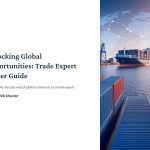 Transitioning into the field of international trade can be an exciting and rewarding career move. This sector offers numerous opportunities but also presents its own unique challenges. If you’re considering a career shift into international trade, understanding the key aspects of this field and how to successfully navigate your move will be essential for success.
Transitioning into the field of international trade can be an exciting and rewarding career move. This sector offers numerous opportunities but also presents its own unique challenges. If you’re considering a career shift into international trade, understanding the key aspects of this field and how to successfully navigate your move will be essential for success.

Why is International Trade a Promising Career Path?
International trade has become an essential part of the global economy, connecting businesses across borders and facilitating the movement of goods, services, and capital. For those considering a career in this field, there are several key reasons why it is an attractive option.
Growth of Global Trade
As globalization continues to reshape economies, international trade plays a pivotal role in the economic development of countries around the world. The expansion of global trade has opened new doors for professionals in the sector, providing various career opportunities across industries.
Moreover, with the rise of e-commerce and digital platforms, the need for international trade professionals has surged, creating even more demand for skilled individuals in this field.
Diverse Career Opportunities
International trade professionals can explore a wide range of roles in different industries such as logistics, customs brokerage, import/export management, and trade compliance. Additionally, working in multinational corporations, government agencies, or international organizations offers an exciting, diverse working environment.

Key Skills Required for International Trade Careers
To succeed in international trade, it’s important to develop a specific skill set that will allow you to navigate the complexities of global markets. These skills include both technical and interpersonal abilities, ensuring that you can thrive in a dynamic, ever-changing environment.
Analytical Thinking and Problem-Solving
International trade professionals often need to assess market trends, analyze economic data, and solve complex issues related to tariffs, regulations, and trade agreements. Strong analytical and problem-solving skills are essential for identifying opportunities and addressing challenges in the global market.
Cross-Cultural Communication
As international trade involves working with clients, partners, and suppliers from different cultural backgrounds, having strong communication skills is critical. Being able to understand cultural nuances and communicate effectively will not only improve your relationships but also lead to better negotiation outcomes.

Steps to Transition into International Trade
Successfully transitioning into international trade requires a clear plan, from acquiring the necessary qualifications to gaining relevant experience. Here are some practical steps to guide you through the process.
1. Assess Your Current Skills
Before making the switch, take stock of your current skills. Do you have experience in logistics, sales, or customer service? Understanding your transferable skills will help you identify areas where you can leverage your existing knowledge while learning new trade-specific skills.
2. Obtain Relevant Qualifications and Certifications
While a degree in international relations, economics, or business can provide a solid foundation, gaining certifications specific to international trade can significantly boost your credentials. For example, certifications such as the Certified International Trade Professional (CITP) or customs brokerage certifications can make you stand out to potential employers.
3. Gain Hands-On Experience
Internships, volunteer opportunities, or entry-level positions in trade-related roles will allow you to gain practical experience and network within the industry. Experience in logistics, customs procedures, or international finance will also provide a competitive edge when applying for full-time roles in international trade.

Challenges in International Trade Careers
While the field of international trade offers many opportunities, it’s not without its challenges. It’s important to be aware of these challenges and develop strategies to overcome them.
Regulatory and Compliance Issues
International trade is heavily regulated, with a multitude of rules, regulations, and trade agreements that vary from country to country. Navigating this legal landscape requires constant learning and adaptability, especially as new trade agreements and tariffs are introduced.
Political and Economic Uncertainty
Global trade is influenced by political and economic factors, such as trade wars, sanctions, and changes in government policies. These uncertainties can impact trade patterns and create unpredictable market conditions. Professionals in international trade must be able to react quickly and adjust strategies in response to shifting global trends.

Where to Look for International Trade Jobs?
The global nature of the international trade sector means that there are opportunities worldwide. Some of the most common industries where trade professionals are in demand include:
- Logistics and Supply Chain Management
- Customs and Import/Export Management
- International Marketing and Sales
- Trade Policy and Government Agencies
Some well-known companies in the international trade space include multinational corporations, shipping companies, logistics firms, and even governmental trade bodies. Job search websites, trade associations, and networking events are excellent resources for discovering new job opportunities in international trade.

Conclusion: Making Your Transition a Success
A successful transition into the field of international trade requires a combination of strategic planning, the development of key skills, and gaining hands-on experience. By focusing on your transferable skills, pursuing relevant qualifications, and gaining practical experience, you can position yourself for success in this dynamic and growing industry.
6imz_ Frequently Asked Questions (FAQs)
Q1: Do I need a specific degree to work in international trade?
While a degree in international business, economics, or international relations is beneficial, it is not always required. Many employers look for relevant experience, certifications, and skills that align with the specific demands of the trade position.
Q2: What are the best industries to work in within international trade?
Some of the top industries include logistics, customs management, international sales and marketing, and government trade agencies. These industries offer diverse opportunities and play a central role in global commerce.
6imz_ Final Thou
*Capturing unauthorized images is prohibited*




